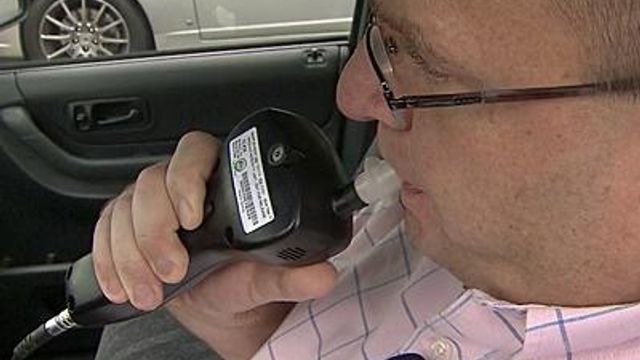NTSB: Use ignition locks for all drunken drivers
Every state should require convicted drunken drivers, including first-time offenders, to use devices that prevent them from starting a car's engine if their breath tests positive for alcohol, the National Transportation Safety Board said Tuesday.
Posted — UpdatedThe ignition interlock devices — already required for all convicted drunken drivers in 17 states — are currently the best available solution to reducing drunken driving deaths, which account for about a third of the nation's more than 32,000 traffic deaths a year, the board said.
Drivers breathe into breathalyzers mounted on the vehicle's dashboard. If their breath-alcohol concentration is greater than the device's programmed limit — usually a blood alcohol concentration of .02 percent or .04 percent — then the engine won't start.
In North Carolina, only people convicted of drunken driving with a blood alcohol level of .15 or higher are required to have the devices on their vehicles. They must also pay an installation fee of at least $75 and a monthly fee of about $75 for as long as they have the device.
The board also urged the National Highway Traffic Safety Administration to speed up its research effort with automakers to develop systems that can determine a driver's blood alcohol concentration using infrared light when the driver presses an ignition button.
If the technology were incorporated into all new vehicles, eventually all drivers would be alcohol-tested before driving. That could potentially prevent an estimated 7,000 drunken-driving deaths a year, the board said.
The five-member board made the unanimous recommendations after reviewing evidence that an average of 360 people a year are killed when drivers turn the wrong way into the face of oncoming traffic on high-speed highways.
The board's study analyzed data from 1,566 crashes from 2004 to 2009, as well as nine wrong-way collisions NTSB directly investigated.
In 59 percent of the wrecks, wrong-way drivers had blood alcohol levels more than twice the legal limit. In another 10 percent of the crashes, drivers had alcohol levels between .08 and .14. The limit in most instances is .08.
"Wrong-way crashes shatter lives and families," said NTSB Chairwoman Deborah Hersman, calling the report and the recommendations a "milestone" for the board.
The technologies hold "great promise to be a game changer in highway safety," she said.
The board's recommendations are likely to be strongly opposed by the alcohol industry.
The American Beverage Institute, which represents about 8,000 chain restaurants in the U.S., said mandatory ignition interlock devices should be reserved for "hardcore" drunken drivers and it opposes the new technology that government and industry are researching.
First-time drunken drivers with blood alcohol levels that are less than double the legal limit should be treated differently than drivers with higher alcohol levels and repeat offenders, Sarah Longwell, the institute's managing director, said.
"You don't punish somebody going 5 miles over the speed limit the same way you do somebody going 50 miles over the speed limit," she said.
Also, the developing technology would effectively prevent any one with relatively small amounts of alcohol in their blood from driving, Longwell said.
"This would eliminate people's ability to have a glass of wine with dinner or to have a beer at a ballgame and then drive home," she said.
Reducing drunken driving is perhaps the most obvious way to reduce wrong-way driving fatalities and injuries.
The board hosted a forum earlier this year on the problem of drivers impaired by alcohol and drugs.
Alcohol-impaired crashes overall accounted for nearly 31 percent motor vehicle fatalities 2010. And, that percentage has remained stuck between 30 and 32 percent of overall highway fatalities since 1995, board members said.
Safety advocates have been lobbying states to pass more laws requiring ignition interlock devices for first-time offenders.
According to the Governors Highway Safety Association, states that already have such laws on the books are: Alaska, Arizona, Arkansas, Colorado, Connecticut, Hawaii, Illinois, Kansas, Louisiana, Missouri, Nebraska, New Mexico, New York, Oregon, Utah, Virginia and Washington.
Missouri's law does take effect until next fall. Also, four California counties — including Los Angeles — have ignition interlock laws.
"The laws may vary some, but the common thread is that they are for all first time offenders," Jonathan Adkins, deputy executive director of the association, said.
Copyright 2024 by WRAL.com and the Associated Press. All rights reserved. This material may not be published, broadcast, rewritten or redistributed.





